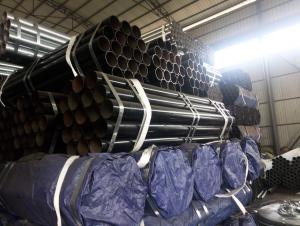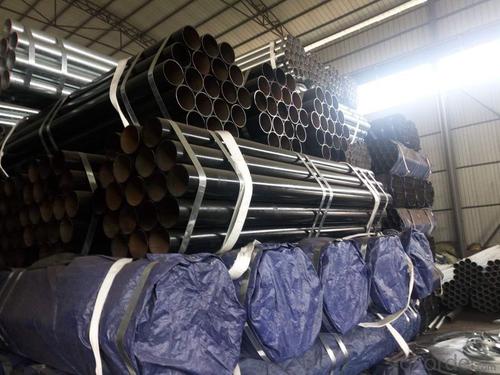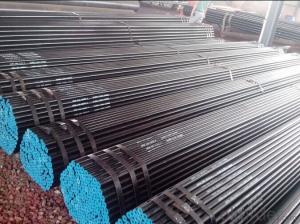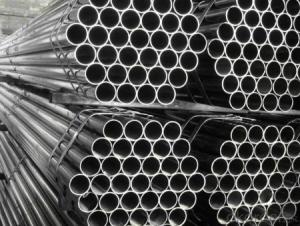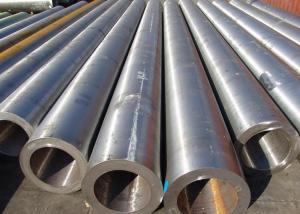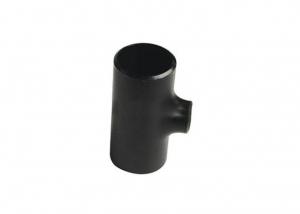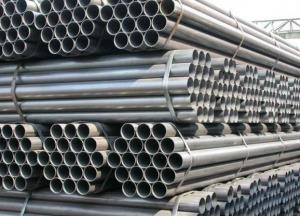Seamless Carbon And Alloy Steel Tubing for sell
- Loading Port:
- Tianjin
- Payment Terms:
- TT OR LC
- Min Order Qty:
- 50 m.t
- Supply Capability:
- 5000 m.t/month
OKorder Service Pledge
OKorder Financial Service
You Might Also Like
1、Structure of Seamless Carbon And Alloy Steel Tubing good sell:
Seamless pipe is formed by drawing a solid billet over a piercing rod to create the hollow shell. As the manufacturing process does not include any welding, seamless pipes are perceived to be stronger and more reliable. Historically seamless pipe was regarded as withstanding pressure better than other types, and was often more easily available than welded pipe.
2、Main Features of Seamless Carbon And Alloy Steel Tubing good sell:
• High manufacturing accuracy
• High strength
• Small inertia resistance
• Strong heat dissipation ability
• Good visual effect
• Reasonable price
3、Seamless Carbon And Alloy Steel Tubing good sell Specification:
Standard | GB, DIN, ASTM ASTM A106-2006, ASTM A53-2007 |
Grade | 10#-45#, 16Mn 10#, 20#, 45#, 16Mn |
Thickness | 8 - 33 mm |
Section Shape | Round |
Outer Diameter | 133 - 219 mm |
Place of Origin | Shandong, China (Mainland) |
Secondary Or Not | Non-secondary |
Application | Hydraulic Pipe |
Technique | Cold Drawn |
Certification | API |
Surface Treatment | factory state or painted black |
Special Pipe | API Pipe |
Alloy Or Not | Non-alloy |
Length | 5-12M |
Outer Diameter | 21.3-610mm |
Grade | 20#, 45#, Q345, API J55, API K55, API L80, API N80, API P110, A53B |
Standard | ASME, ASTM |
1) Material:20#(ASTM A 106/A53 GRB.API5LGRB,GB),45#,16Mn,10#.
2) Specification range:OD:21.3-610mm,WT:6-70mm,length:6-12m or according to the requirement of clients.
3) Excutive standards:GB,ASME API5L.ASTM A 106/A53,Despite of the above standards,we can also supply seamless steel pipe with standard of DIN,JIS,and so on,and also develop new products according to the requirements of our clients!
4) Surface:black lacquered,varnish coating or galvanized.
5) Ends:Beveled or square cut,plastic capped,painted.
6) Packing:bundles wrapped with strong steel strip,seaworthy packing.
4、Packaging & Delivery
Packaging Details: | seaworthy package,bundles wrapped with strong steel strip |
Delivery Detail: | 15-30days after received 30%TT |
5、FAQ of Seamless Carbon And Alloy Steel Tubing good sell:
①How is the quality of your products?
Our products are manufactured strictly according to national and internaional standard, and we take a test
on every pipe before delivered out. If you want see our quality certifications and all kinds of testing report, please just ask us for it.
Guaranteed: If products’ quality don’t accord to discription as we give or the promise before you place order, we promise 100% refund.
②How about price?
Yes, we are factory and be able to give you lowest price below market one, and we have a policy that “ for saving time and absolutely honest business attitude, we quote as lowest as possible for any customer, and discount can be given according to quantity”,if you like bargain and factory price is not low enough as you think, just don’t waste your time.Please trust the quotation we would give you, it is professional one.
③Why should you chose us?
Chose happens because of quality, then price, We can give you both.Additionally, we can also offer professional products inquiry, products knowledge train(for agents), smooth goods delivery, exellent customer solution proposals.Our service formula: good quality+good price+good service=customer’s trust
SGS test is available, customer inspection before shipping is welcome, third party inspection is no problem.
6、Seamless Carbon And Alloy Steel Tubing good sell Images:
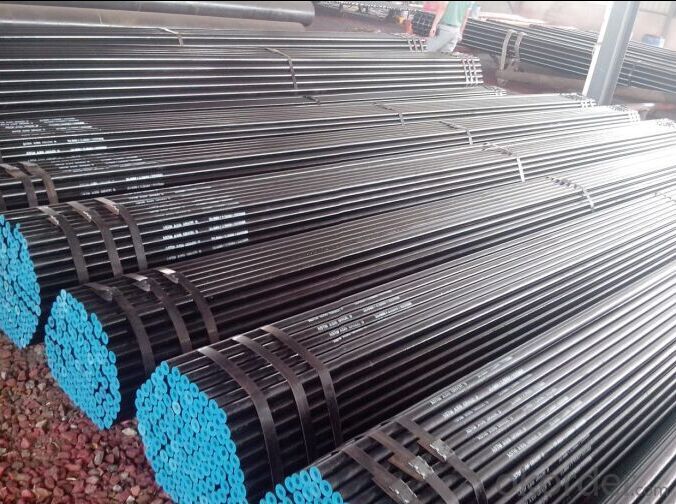
- Q: What type of steel pipe dance is used in general?
- According to international competition practice, the standard size of steel tube is 40 mm or 45 mm in diameter, and the 45mm is usually used. The height of the steel pipe is not less than 3.3 meters and not higher than 4 meters.
- Q: How are steel pipes used in the manufacturing of chemical processing equipment?
- Steel pipes are commonly used in the manufacturing of chemical processing equipment due to their durability, corrosion resistance, and ability to withstand high temperatures and pressures. These pipes are used to transport fluids, such as chemicals, gases, and liquids, throughout the various stages of the manufacturing process. In chemical processing equipment, steel pipes are primarily used for two main purposes: as conduits for the transportation of raw materials and as channels for the distribution of processed products. Firstly, steel pipes are used to transport raw materials, such as chemicals and solvents, from storage tanks or external sources to the various processing units within the equipment. These pipes ensure the safe and efficient movement of these materials, allowing for accurate and controlled dosage and distribution. Steel pipes are preferred due to their strength, which enables them to handle the high pressures and temperatures involved in chemical processing. Secondly, steel pipes are used to distribute the processed products throughout the equipment. Once the raw materials have undergone various chemical reactions and transformations, the resulting products need to be transported to the next stage or collected for further processing. Steel pipes are ideal for this purpose as they can withstand the corrosive nature of many chemicals and can handle the high temperatures encountered during these processes. Furthermore, steel pipes are also used in chemical processing equipment for their versatility and compatibility with various chemicals and solvents. They can be easily customized to accommodate specific requirements, such as different pipe sizes, shapes, and fittings. This flexibility allows for efficient design and installation, ensuring a seamless flow of materials and products throughout the equipment. Overall, steel pipes play a crucial role in the manufacturing of chemical processing equipment by providing a reliable and efficient means of transporting raw materials and distributing processed products. Their durability, corrosion resistance, and ability to withstand high temperatures and pressures make them an essential component in ensuring the safe and efficient operation of chemical processing equipment.
- Q: Are steel pipes suitable for underground chemical transport?
- Steel pipes are widely regarded as appropriate for transporting chemicals underground because of their high strength and durability. They have the ability to endure the pressure and weight of the soil above, rendering them impervious to harm or collapse. Furthermore, steel pipes possess corrosion resistance, which is vital when conveying chemicals that might react with or corrode other substances. They also have the capability to handle a wide range of temperatures, making them suitable for transporting chemicals that necessitate specific temperature conditions. Nevertheless, it is crucial to carefully consider the particular chemical being transported and seek advice from experts in chemical engineering or pipeline design to guarantee the compatibility of the steel pipes with the chemical and the implementation of any necessary safety precautions.
- Q: What does "HBB" glass steel pipe mean?
- Non electrical corrosion, non-magnetic, suitable for single core cable laying, and steel pipe is a magnetic material, special treatment must be taken to prevent the formation of eddy currents.
- Q: What are the industries that commonly use steel pipes?
- Some of the industries that commonly use steel pipes include construction, oil and gas, water and wastewater treatment, mining, manufacturing, automotive, and infrastructure development.
- Q: Are steel pipes suitable for underground irrigation pumping?
- Indeed, steel pipes prove to be a fitting option for underground irrigation pumping. Renowned for their robustness and resilience, steel pipes present themselves as an optimal selection for subterranean utilities. They boast the capacity to endure substantial pressure, ward off corrosion, and remain less susceptible to soil shifting or fluctuations in temperature. Moreover, steel pipes exhibit a lengthier lifespan when juxtaposed with alternative materials, thereby mitigating the necessity for frequent replacements. However, it remains imperative to guarantee meticulous coating or lining of the steel pipes to avert corrosion and to consistently examine and uphold them for their continued efficacy and durability.
- Q: What is the importance of corrosion resistance in steel pipes?
- The importance of corrosion resistance in steel pipes is crucial as it helps to extend the lifespan of the pipes and maintain their structural integrity. Corrosion can weaken the pipes, leading to leaks, breakages, and ultimately, costly repairs or replacements. By preventing or minimizing corrosion, steel pipes can effectively transport fluids or gases, ensuring safety, efficiency, and longevity in various industries such as oil and gas, water supply, and construction.
- Q: Can steel pipes be used for sewage disposal systems?
- Yes, steel pipes can be used for sewage disposal systems. Steel pipes are durable, resistant to corrosion, and have high strength, making them suitable for conveying sewage and wastewater. Additionally, steel pipes can handle high-pressure systems and are often used in industrial and commercial applications for sewage disposal.
- Q: Are steel pipes suitable for underground gas lines?
- Indeed, underground gas lines can be effectively constructed using steel pipes. Renowned for their robustness and longevity, steel pipes are a dependable option for distributing gas underground. Their exceptional resistance to external elements, including corrosion and impact, is crucial for upholding the gas system's integrity. Moreover, steel pipes possess the ability to endure high pressure and temperature fluctuations, guaranteeing the secure and efficient transportation of gas beneath the surface. Nonetheless, it is vital to emphasize the significance of adhering to proper installation techniques, such as implementing corrosion protection measures, in order to ensure the steel pipes' durability and prevent any potential leaks or accidents.
- Q: Can steel pipes be used for underground power transmission?
- Indeed, underground power transmission can make use of steel pipes. Due to their resilience, robustness, and resistance to corrosion, steel pipes are extensively employed in underground power transmission systems. These pipes serve as a safeguarding enclosure for power cables, guaranteeing their security and shielding them from potential harm caused by external elements like moisture, soil movements, and potential impacts. Moreover, the use of steel pipes facilitates easy installation, maintenance, and repair of the power transmission system. Additionally, their ability to withstand high pressure and temperature renders them suitable for conveying the high voltage electricity essential for power transmission. All in all, steel pipes are a dependable and effective choice for underground power transmission.
Send your message to us
Seamless Carbon And Alloy Steel Tubing for sell
- Loading Port:
- Tianjin
- Payment Terms:
- TT OR LC
- Min Order Qty:
- 50 m.t
- Supply Capability:
- 5000 m.t/month
OKorder Service Pledge
OKorder Financial Service
Similar products
Hot products
Hot Searches
Related keywords
